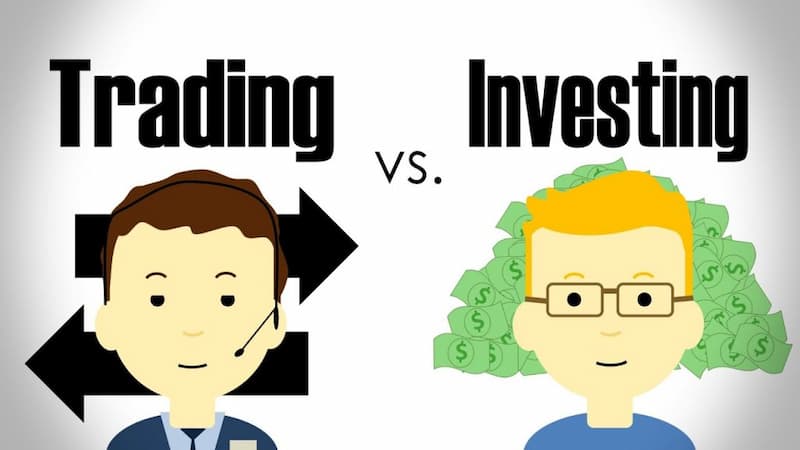5 Key Differences Between Investing And Trading

Both investors and traders seek remarkable profits through market participation like trading and investment. Straightway, investors follow a long-term approach toward the stock market, while traders generally follow short-term strategies to maximize profits. Time horizon, i.e., how long you are willing to hold a position in the market and the mindset to take risks are the two primary factors to choose between the two.
Key Differences
-
Risk Involved
The risk-reward ratio is high in trading as compared to investing. The risk involved in investing is lower as investors avoid short-term volatility. In contrast, trading is risky as traders gain on short-term market fluctuations that can not be predicted accurately.
-
Investment Horizon
Investing is a long-term approach like a cricket test match. Individuals invest with the idea of holding stocks for many years for high investment growth. On the other hand, trading is a short-term approach like the cricket T20 match. Traders can buy or sell stocks within a few seconds or a few months to earn the slightest possible profits.
-
Primary Account
An individual requires a trading account and a Demat account to enter the market. The demat full form is dematerialisation. The primary account for investors is their demat accounts, as they need to hold their securities for longer than traders. A trading account is the primary account of traders as they make frequent trades. However, you need to create both demat and trading accounts for both investing and trading. You can connect with a stockbroker to know ‘how to create demat account online.’
-
Capital Growth
Investors are focused on wealth creation over the long term with minimized risk. Generally, investing is aimed at regular passive income like dividends, bonuses, and long-term capital gains. In contrast, trading is aimed at making quick and short-term profits. You may have to follow different strategies every day.
-
Efforts and Skills
At the initial level of investing, investors need to put more effort to analyse a stock, and fewer efforts are involved while tracking your investments. In comparison, trading involves regular analysis to determine the market fluctuations and trends. Traders have to put extra efforts into a track of stock to make extraordinary profits.
-
Analysis
An investor performs fundamental analysis that involves financial statements of the company, ratios like the P/E ratio, and future growth prospects. In contrast, a trader performs technical analysis that involves analysis of past movements of the stock, patterns in charts and graphs, etc., to decide profitability level.
Types of Investing
- Value Investing: Here, investors are focused on reducing the risk involved in the stock market, buying the stocks of well-established companies only and maintaining the value of the investment.
- Growth Investing: Here, investors are aimed at increasing the investment value over time. Investors prefer stocks with a higher potential for growth, even if it increases the risk quotient.
Types of Trading
- Position Trading: Traders prefer to buy or sell stocks within a few months.
- Swing Trading: Traders hold stocks for days or weeks to gain from the market.
- Day Trading: Traders have to buy or sell stocks within a trading session.
- Scalp Trading: Traders make the gain from the tiniest opportunity and buy and sell stock within a few seconds or a few minutes.
Thus, you can make informed decisions to choosing your investing or trading style.
Investing and trading can be differentiated by approaches, risk, and time involved. An individual can choose one approach or both, depending on risk-taking ability, dedicated time, and patience. You can make profits in both, but traders need to trade more frequently as compared to investors to book profits. If they make the right decisions and the market is performing accordingly, traders can make much higher than investors quickly.
From the layman’s perspective, you may want to mix both. Obviously, investing for wealth accumulation and trading for passive income. But it may be challenging practically. It is also expected that you decide your financial goals even before entering the market. It will help you to choose the right stocker broker to start your investing or trading journey.
How can I start stock investing & trading online in India?
An investor who wants to start trading/investing in the stock markets would have to compulsorily own a demat and a trading account. Now the question here is, how to create demat account? A demat account is an account that holds securities or stocks in electronic form. One can open a demat account with any of the financial institutions, banks, discount brokers or etc. Once you have opened a demat account, you can start with investing & then trading in the stock markets.
It is important that an investor remains updated about the financial whereabouts of the different sectors so as to understand the market ups & downs on a daily basis. When all of these are done, the next question here can be, how to create demat account with minimal charges so as to reduce the overall charges on a trade executed? An investor can select a broker that best suits his needs & compare the charges offered by different brokers & then select a full-service broker or a discount broker.
Finally, an investor can choose the stocks that are as per his risk appetite and the tenure he is ready to hold for (i.e., long-term investing or short-term investing). Tax benefits are better in long-term investing as compared to short term investing in the stock markets.
Read also:- Intraday Trading: The Basics & How To Get Started Fast



